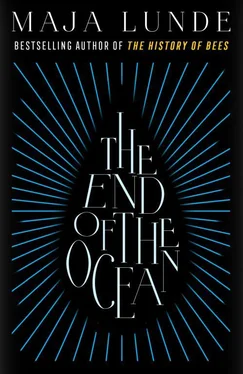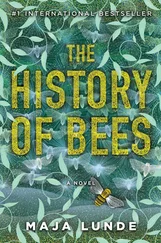“Everything will disappear,” I said. “Everything we love will disappear. And it’s your fault.” I almost couldn’t talk now. I leaned forward. “You destroy everything.”
Daddy said nothing, just looked at me across the breakfast table, over the hard-boiled eggs and smoked salmon, and now he would have to say something, I thought, now he would be forced to finish what he’d started.
But he was silent and I was a teeny-tiny water person in a snow globe. I pounded my hands against the glass and screamed and tried to get out and that’s why I also said the very last thing, what I knew that she didn’t know, which could be significant, which could break the glass.
“Daddy talked to Sønstebø.”
“Sønstebø?”
“He talked to Sønstebø up on the mountain, on the road, the new road, we were out hiking, they met up and nobody was supposed to know about it.”
Mommy just stared at me.
“They didn’t want anyone to see them,” I continued. “It wasn’t worth the risk, they said, that someone might see them together.”
“Bjørn?” Mommy said.
“It wasn’t worth the risk,” I said. “They didn’t want to be seen together.”
*
It was the night Daddy blew up the bridge, he and Sønstebø met up there in the darkness, that’s how it must have been. And maybe the lights from the truck were the first thing he saw before Sønstebø emerged, his black silhouette splitting the light in two. Sønstebø who had been a shot firer as a young man, he was probably the one behind this, or maybe it was actually Daddy, that could be, that my full-of-rage Daddy made contact with Sønstebø, that he was the one who planned the whole thing.
But I was the one who told on him, told Mommy, and after that morning Daddy was alone. He moved to the house by the harbor. His things, his books, wall charts, articles and lithographs of nature scenes, filled it to the brim; the smell of them filled the small rooms and made them into something familiar, even though the walls were alien.
The windows were thin. The sound of the boats penetrated them, the sound of cables striking masts in the wind, the thudding of motors, the banging of fish crates against the decks, skippers calling. The sound of his typewriter couldn’t drown out all of this.
I’m going to Mommy’s, I said when I left Daddy; I’m going to Daddy’s, I said to Mommy. My place was on the gravel road that went through the village, from the cramped house in the harbor to the hotel with its almost one hundred rooms and back again. I remember myself as being infinitely small, lonely, plagued by guilt, and impressionable. I was just waiting for Magnus, without knowing it myself.
“Now it’s time for bed,” I said as we walked towards Hall 4.
Lou replied with a loud yawn.
It was late today, too. Much later than I’d planned, still no system for bedtime.
The young boys from the line were sitting by the entrance to the hall, in a circle around a pot, like it was a campfire. Each of them held their own cup.
“Tea?” one of them asked me in English as we walked past.
The other two snickered.
Maybe it wasn’t tea in the pot, maybe they were drinking something else altogether. It was too dark for me to be able to see their eyes, whether they were under the influence.
“Do you all live in here?” I asked.
“We were assigned places here, yes,” the first one said.
“He has to sleep on the floor,” the other one said and pointed at the third.
The hall had become crowded over the past couple of days.
“We can take turns. Every third night,” he said.
“Yeah, right,” the first one said.
They had a good laugh about that. A little listless. A laughter that lingered.
They were my age, but nonetheless younger. They only had themselves.
And were they drinking something? Warmth in the stomach, the gradual heaviness, lightness, the thoughts obliterated. The taste of alcohol on the tongue, in the body. It had been a long time.
But Lou was standing beside me. Lou, whose eyes were rolling with drowsiness, who said nothing, but whose presence was strong nonetheless.
I wanted to push her along with me into the hall, but the first guy grabbed hold of my shin.
“C’mon, have a seat,” he said.
“Have some tea,” the other one said.
“Mint tea,” the third one said. “Found it in a garden along the way. It’s been hanging from my knapsack, drying out.”
Mint tea? Was it only mint tea?
“I just have to put the little one to bed first,” I said.
*
Their names were Christian, Caleb and Martin. They spoke to me quickly, in broken English, just as bad as my own. Christian and Caleb had met in a camp up in the mountains further south, a camp from which everyone had fled. They had picked up Martin along the way.
They came from southern Spain all three of them, from the desert. Nobody could be bothered to say much about the time before. But they had many stories from the road and from the last camp. All the stories ended in laughter, as if the things they’d experienced were from one long road trip with the boys. It was only when they talked about the guy in the line that they changed, that the hardness came over them again. They called him a bastard from the north, a water bastard.
“They have the Ebro, so they think they have everything,” Caleb said.
“A tiny corner of Spain that wants to isolate itself from the rest,” Martin said.
“They criticize the water countries, but do the same thing themselves, in their own country,” Christian said.
“When those of us in the south can’t manage to combine our resources,” Caleb said, “share what we actually have, how will… how…” He didn’t finish.
“I don’t give a shit,” Martin said. “I don’t give a shit about Spain. It’s not my country any longer. I don’t want to live there. Or here. It just keeps getting worse. Soon there will be desert everywhere. I’m going to save myself. Make it to the rain.”
They all nodded, they all felt the same way.
But then Martin laughed, started mouthing off and the others played along, partly in Spanish and partly in English, out of politeness towards me.
And it was only mint tea. They snickered when I told them I thought it was something else, said that they wouldn’t have minded that. Caleb mumbled that he’d heard there was a way to get hold of some, that there was a guy selling it in Hall 3. I replied that it wasn’t for me, that I needed to keep my wits about me, for Lou’s sake.
“I have a child to think about,” I said.
At that moment I remembered that I’d forgotten to check whether she had fallen asleep. She was accustomed to my being there with her, to our going to bed at the same time. But she hadn’t come out again, so it was probably fine. She was probably fast asleep.
I took another sip, but was unable to relax. I had a feeling that something was wrong.
“Sorry,” I said and got to my feet.
*
The hall was in semidarkness. Many people were already sleeping. But Lou was awake. Her little face was pale, and her eyes were open wide.
“Hello there,” I said, and sat down beside her.
She just stared straight in front of her.
“Is something wrong?”
“It hurts,” she said.
And now I noticed how stiff her body was, lying there with her knees against her tummy. Her entire body was tense.
“Where does it hurt?” I asked, even though I knew the answer.
“My tummy.”
“Are you sick to your stomach?”
“It hurts.”
I was about to say something. About the water. About the rag. I told you so , I was going to say. Why did she have to go and suck on that damn rag? I had been very clear. It was dangerous. Water poisoning, people had been dying from it in droves in recent years.
Читать дальше










